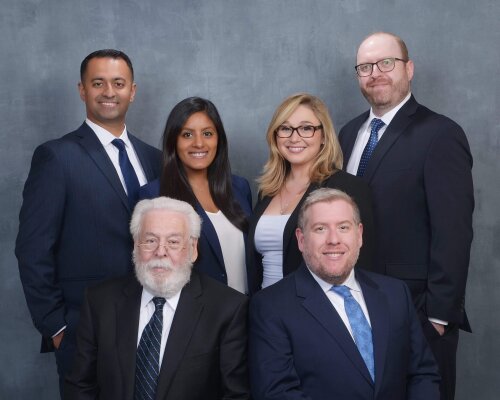Best Travel Accident Lawyers in Philadelphia
Share your needs with us, get contacted by law firms.
Free. Takes 2 min.
List of the best lawyers in Philadelphia, United States
About Travel Accident Law in Philadelphia, United States
Travel accident law covers legal issues that arise when people are injured or suffer loss while using transportation - including cars, taxis, rideshare services, buses, trains, airplanes, and cruise ships. In Philadelphia, travel-accident matters intersect with local, state and federal rules depending on the mode of travel and the responsible parties. Common legal concepts include negligence, liability, insurance coverage, evidence preservation and time limits for filing claims. Whether the accident involves a private driver, public transit such as SEPTA, an interstate bus, an airline or maritime carrier, the rules that apply and the agencies involved can differ significantly.
Why You May Need a Lawyer
Travel-accident cases can be legally complex and fact-intensive. A lawyer can help in these common situations:
- Serious injury or death. When injuries are life-changing, long-term or fatal, legal action may be necessary to obtain compensation for medical care, lost income, rehabilitation and loss of support.
- Disputed fault. If the other party denies responsibility or blames you, an attorney helps gather evidence and build a liability case.
- Complex defendants. Claims against transportation companies, government agencies, airlines or cruise lines may involve special notice requirements, immunity rules or federal law. Lawyers who handle these cases know the procedural hurdles.
- Insurance disputes. Insurers may undervalue claims, deny coverage or use policy limitations against you. An attorney negotiates with insurers and decides when litigation is necessary.
- Multiple sources of compensation. Accidents may trigger claims against several parties - drivers, employers, vehicle manufacturers, maintenance contractors or transit authorities. Counsel coordinates claims and fights double recovery issues.
- Preservation of rights. Missing deadlines or improperly handling notice requirements can bar recovery. A lawyer ensures claims are filed correctly and on time.
Local Laws Overview
Below are key legal rules and practical considerations that are particularly relevant to travel-accident matters in Philadelphia and Pennsylvania.
- At-fault system and comparative negligence - Pennsylvania uses a modified comparative-negligence rule. You can recover damages only if you are 50 percent or less at fault. If you are 51 percent or more at fault, you are barred from recovery. Your recovery is reduced by your percentage of fault.
- Statute of limitations - For most personal-injury claims in Pennsylvania, you generally have two years from the date of the injury to file a lawsuit. Wrongful-death claims also typically must be filed within two years. Certain claims or defendants can have different deadlines.
- Governmental and transit claims - Claims against Philadelphia city agencies or other political subdivisions, including some public transit claims, may require early notice or use special procedures under Pennsylvania law. SEPTA matters and claims against municipal entities often require prompt written notice and may involve different filing rules than private-party claims.
- Insurance minimums and coverage - Pennsylvania sets minimum auto-insurance limits for bodily injury and property damage. Rideshare incidents may involve layered insurance coverage from a driver, the rideshare company and personal policies; coverage depends on the driver status at the time of the crash.
- Federal rules for certain carriers - Aviation and interstate bus and rail incidents can fall under federal law. International air-travel claims may be governed by international treaties. Cruise-ship and maritime incidents can involve admiralty and maritime law and may include contract terms such as forum-selection or arbitration clauses in tickets.
- Evidence and investigation - For transportation accidents, relevant evidence may include police reports, surveillance video, ticket and boarding records, maintenance logs, vehicle-event data recorders, black box or flight data, operator training and staffing records. Preserving such evidence early is critical.
Frequently Asked Questions
What should I do first after a travel-related accident in Philadelphia?
Prioritize safety and medical care. Call emergency responders if needed and seek medical attention even if injuries seem minor. Report the incident to police or the transportation provider and gather basic information - names, contact details, vehicle or vehicle number, insurance details, witness names and photos. Preserve tickets, receipts, boarding passes and any physical evidence. Contact your insurer and consider consulting an attorney before signing releases or accepting settlement offers.
How long do I have to file a claim after a travel accident in Pennsylvania?
For most personal-injury and wrongful-death claims, Pennsylvania provides a two-year statute of limitations from the date of injury. Some claims against government entities or certain federal claims may have shorter or different deadlines. Because time limits can be strict, consult an attorney promptly to protect your rights.
Will SEPTA or other public transit agencies be treated differently than a private driver?
Yes. Claims involving SEPTA or other government-controlled transit providers can involve special notice requirements and immunities under state law. You may need to provide written notice within a short timeframe and follow specific administrative steps before filing suit. An attorney experienced with public-transit claims can help meet these unique procedural requirements.
What kinds of damages can I recover after a travel accident?
You can typically seek compensatory damages including past and future medical expenses, lost wages, loss of earning capacity, pain and suffering, emotional distress and property damage. In limited cases involving gross negligence or willful misconduct, punitive damages may be available. The types and amounts of recoverable damages depend on the facts, applicable law and whether fault is shared.
How does comparative negligence affect my claim?
Under Pennsylvania law, your recovery is reduced by your share of fault. If you are 20 percent at fault, your damages award will be reduced by 20 percent. If you are found 51 percent or more at fault, you generally cannot recover. Building strong evidence to minimize your fault allocation is central to maximizing recovery.
Are there special rules for airline, train or cruise incidents?
Yes. Aviation incidents can be governed by federal law or international treaties when flights are international. Rail and interstate bus claims may involve federal regulations. Cruise-ship incidents are often governed by maritime law, and cruise tickets may contain terms that limit suits or require arbitration. These special regimes can affect filing deadlines, venue, liability standards and remedies.
What if the at-fault driver is uninsured or underinsured?
If the at-fault party lacks sufficient insurance, you may rely on your own uninsured or underinsured motorist coverage if you have it. For accidents involving commercial carriers, employers or manufacturers, you may have additional avenues of recovery. An attorney can identify all potential sources of compensation.
Should I accept the insurer's first settlement offer?
Exercise caution. Early offers from insurers are often lower than the true value of a claim and may not account for long-term medical needs. Before accepting any settlement, consider consulting a lawyer who can evaluate damages, estimate future costs and negotiate. Once you sign a full-release settlement, you typically cannot reopen the claim.
How is liability proven in a travel-accident case?
Most travel-accident cases are based on negligence. To prove liability you generally must show that the defendant owed you a duty of care, breached that duty by acting or failing to act reasonably, caused your injury, and caused measurable damages. Evidence such as accident reports, witness statements, video, physical evidence and expert testimony can be critical.
How much will a lawyer cost if I bring a travel-accident claim?
Many personal-injury lawyers handle travel-accident cases on a contingency-fee basis - the lawyer is paid a percentage of any recovery and may advance case costs. This makes representation accessible to many people, but fee agreements vary. Ask about fees, costs, and how expenses are handled during your initial consultation, and get the fee agreement in writing.
Additional Resources
When researching or pursuing a travel-accident matter, the following organizations and agencies can be helpful for information and reporting:
- Philadelphia Court of Common Pleas - civil court where many local personal-injury suits are filed
- Philadelphia Police Department - for criminal investigations and accident reports
- Southeastern Pennsylvania Transportation Authority - for SEPTA incident reporting and policies
- Pennsylvania Department of Transportation - for roadway and safety information
- Pennsylvania Insurance Department - for questions about insurance coverage and complaints
- Federal Aviation Administration - for domestic aviation safety and regulatory information
- National Transportation Safety Board - investigates major transportation accidents
- Federal Motor Carrier Safety Administration - regulates interstate bus and truck safety
- U.S. Department of Transportation - broader federal transportation oversight
- Philadelphia Bar Association and Pennsylvania Bar Association - for lawyer referrals and resources
- Local legal aid and advocacy groups such as Community Legal Services of Philadelphia and Legal Aid of Southeastern Pennsylvania - may assist people with limited resources
- Pennsylvania Association for Justice and local trial-advocate organizations - for consumer information about injury claims
Next Steps
If you need legal assistance after a travel accident in Philadelphia, consider the following practical steps:
- Get medical care immediately and follow doctors' instructions. Medical records are central to any injury claim.
- Document the scene with photos and collect contact information for witnesses, other parties and any company representatives. Keep tickets, boarding passes and physical evidence.
- Report the accident to police and the transportation provider. Request copies of reports and reference numbers.
- Preserve evidence - do not discard damaged belongings, maintain vehicle repair records and retain communications from insurers or carriers.
- Notify your insurance company in accordance with your policy, but be cautious about detailed recorded statements or signing releases without legal advice.
- Consult an experienced travel-accident or personal-injury lawyer promptly. Ask about experience with the relevant mode of transportation and any contingency-fee arrangements. An attorney can evaluate liability, identify all potential defendants, preserve claims against public or specialized carriers and help meet filing or notice deadlines.
- Keep a record of all medical bills, lost-wage documentation and out-of-pocket expenses related to the accident.
Remember that this guide provides general information only and does not create an attorney-client relationship. For advice about your specific case and legal rights, contact a licensed attorney who practices travel-accident or personal-injury law in Philadelphia.
Lawzana helps you find the best lawyers and law firms in Philadelphia through a curated and pre-screened list of qualified legal professionals. Our platform offers rankings and detailed profiles of attorneys and law firms, allowing you to compare based on practice areas, including Travel Accident, experience, and client feedback.
Each profile includes a description of the firm's areas of practice, client reviews, team members and partners, year of establishment, spoken languages, office locations, contact information, social media presence, and any published articles or resources. Most firms on our platform speak English and are experienced in both local and international legal matters.
Get a quote from top-rated law firms in Philadelphia, United States — quickly, securely, and without unnecessary hassle.
Disclaimer:
The information provided on this page is for general informational purposes only and does not constitute legal advice. While we strive to ensure the accuracy and relevance of the content, legal information may change over time, and interpretations of the law can vary. You should always consult with a qualified legal professional for advice specific to your situation.
We disclaim all liability for actions taken or not taken based on the content of this page. If you believe any information is incorrect or outdated, please contact us, and we will review and update it where appropriate.












